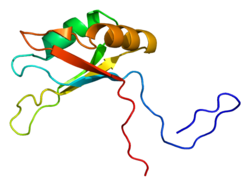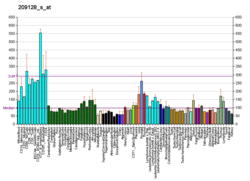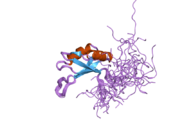From Wikipedia, the free encyclopedia
Protein-coding gene in the species Homo sapiens
SART3 Identifiers Aliases SART3 External IDs OMIM : 611684 ; MGI : 1858230 ; HomoloGene : 40977 ; GeneCards : SART3 ; OMA :SART3 - orthologs Wikidata
Squamous cell carcinoma antigen recognized by T-cells 3 is a protein that in humans is encoded by the SART3 gene .[ 5] [ 6] [ 7]
The protein encoded by this gene is an RNA-binding nuclear protein that is a tumor-rejection antigen . This antigen possesses tumor epitopes capable of inducing HLA-A24 -restricted and tumor-specific cytotoxic T lymphocytes in cancer patients and may be useful for specific immunotherapy . This gene product is found to be an important cellular factor for HIV-1 gene expression and viral replication. It also associates transiently with U6 and U4/U6 snRNPs during the recycling phase of the spliceosome cycle. This encoded protein is thought to be involved in the regulation of mRNA splicing.[ 7]
SART3 has been shown to interact with RNPS1 [ 8] Androgen receptor .[ 9]
^ a b c GRCh38: Ensembl release 89: ENSG00000075856 – Ensembl , May 2017^ a b c GRCm38: Ensembl release 89: ENSMUSG00000018974 – Ensembl , May 2017^ "Human PubMed Reference:" . National Center for Biotechnology Information, U.S. National Library of Medicine .^ "Mouse PubMed Reference:" . National Center for Biotechnology Information, U.S. National Library of Medicine .^ Nagase T, Seki N, Tanaka A, Ishikawa K, Nomura N (August 1995). "Prediction of the coding sequences of unidentified human genes. IV. The coding sequences of 40 new genes (KIAA0121-KIAA0160) deduced by analysis of cDNA clones from human cell line KG-1" . DNA Research . 2 (4): 167– 74, 199– 210. doi :10.1093/dnares/2.4.167 PMID 8590280 . ^ Harada K, Yamada A, Mine T, Kawagoe N, Takasu H, Itoh K (February 2000). "Mouse homologue of the human SART3 gene encoding tumor-rejection antigen" . Japanese Journal of Cancer Research . 91 (2): 239– 47. doi :10.1111/j.1349-7006.2000.tb00937.x . PMC 5926322 PMID 10761712 . ^ a b "Entrez Gene: SART3 squamous cell carcinoma antigen recognized by T cells 3" .^ Harada K, Yamada A, Yang D, Itoh K, Shichijo S (September 2001). "Binding of a SART3 tumor-rejection antigen to a pre-mRNA splicing factor RNPS1: a possible regulation of splicing by a complex formation" . International Journal of Cancer . 93 (5): 623– 8. doi :10.1002/ijc.1391 PMID 11477570 . S2CID 24724555 . ^ Liu Y, Kim BO, Kao C, Jung C, Dalton JT, He JJ (May 2004). "Tip110, the human immunodeficiency virus type 1 (HIV-1) Tat-interacting protein of 110 kDa as a negative regulator of androgen receptor (AR) transcriptional activation" . The Journal of Biological Chemistry . 279 (21): 21766– 73. doi :10.1074/jbc.M314321200 PMID 15031286 .
Maruyama K, Sugano S (January 1994). "Oligo-capping: a simple method to replace the cap structure of eukaryotic mRNAs with oligoribonucleotides". Gene . 138 (1– 2): 171– 4. doi :10.1016/0378-1119(94)90802-8 . PMID 8125298 . Suzuki Y, Yoshitomo-Nakagawa K, Maruyama K, Suyama A, Sugano S (October 1997). "Construction and characterization of a full length-enriched and a 5'-end-enriched cDNA library". Gene . 200 (1– 2): 149– 56. doi :10.1016/S0378-1119(97)00411-3 . PMID 9373149 . Yang D, Nakao M, Shichijo S, Sasatomi T, Takasu H, Matsumoto H, Mori K, Hayashi A, Yamana H, Shirouzu K, Itoh K (August 1999). "Identification of a gene coding for a protein possessing shared tumor epitopes capable of inducing HLA-A24-restricted cytotoxic T lymphocytes in cancer patients". Cancer Research . 59 (16): 4056– 63. PMID 10463607 . Tanaka S, Tsuda N, Kawano K, Sakamoto M, Nishida T, Hashimoto T, Shichijo S, Kamura T, Itoh K (November 2000). "Expression of tumor-rejection antigens in gynecologic cancers" . Japanese Journal of Cancer Research . 91 (11): 1177– 84. doi :10.1111/j.1349-7006.2000.tb00902.x . PMC 5926290 PMID 11092984 . Harada K, Yamada A, Yang D, Itoh K, Shichijo S (September 2001). "Binding of a SART3 tumor-rejection antigen to a pre-mRNA splicing factor RNPS1: a possible regulation of splicing by a complex formation" . International Journal of Cancer . 93 (5): 623– 8. doi :10.1002/ijc.1391 PMID 11477570 . S2CID 24724555 . Sasatomi T, Suefuji Y, Matsunaga K, Yamana H, Miyagi Y, Araki Y, Ogata Y, Itoh K, Shirouzu K (March 2002). "Expression of tumor rejection antigens in colorectal carcinomas" . Cancer . 94 (6): 1636– 41. doi :10.1002/cncr.10421 PMID 11920522 . S2CID 33045822 . Liu Y, Li J, Kim BO, Pace BS, He JJ (June 2002). "HIV-1 Tat protein-mediated transactivation of the HIV-1 long terminal repeat promoter is potentiated by a novel nuclear Tat-interacting protein of 110 kDa, Tip110" . The Journal of Biological Chemistry . 277 (26): 23854– 63. doi :10.1074/jbc.M200773200 PMID 11959860 . Bell M, Schreiner S, Damianov A, Reddy R, Bindereif A (June 2002). "p110, a novel human U6 snRNP protein and U4/U6 snRNP recycling factor" . The EMBO Journal . 21 (11): 2724– 35. doi :10.1093/emboj/21.11.2724 . PMC 126028 PMID 12032085 . Nottrott S, Urlaub H, Lührmann R (October 2002). "Hierarchical, clustered protein interactions with U4/U6 snRNA: a biochemical role for U4/U6 proteins" . The EMBO Journal . 21 (20): 5527– 38. doi :10.1093/emboj/cdf544 . PMC 129076 PMID 12374753 . Nakayama M, Kikuno R, Ohara O (November 2002). "Protein-protein interactions between large proteins: two-hybrid screening using a functionally classified library composed of long cDNAs" . Genome Research . 12 (11): 1773– 84. doi :10.1101/gr.406902 . PMC 187542 PMID 12421765 . Stanĕk D, Rader SD, Klingauf M, Neugebauer KM (February 2003). "Targeting of U4/U6 small nuclear RNP assembly factor SART3/p110 to Cajal bodies" . The Journal of Cell Biology . 160 (4): 505– 16. doi :10.1083/jcb.200210087 . PMC 2173746 PMID 12578909 . Damianov A, Schreiner S, Bindereif A (February 2004). "Recycling of the U12-type spliceosome requires p110, a component of the U6atac snRNP" . Molecular and Cellular Biology . 24 (4): 1700– 8. doi :10.1128/MCB.24.4.1700-1708.2004 . PMC 344176 PMID 14749385 . Liu Y, Kim BO, Kao C, Jung C, Dalton JT, He JJ (May 2004). "Tip110, the human immunodeficiency virus type 1 (HIV-1) Tat-interacting protein of 110 kDa as a negative regulator of androgen receptor (AR) transcriptional activation" . The Journal of Biological Chemistry . 279 (21): 21766– 73. doi :10.1074/jbc.M314321200 PMID 15031286 . Brandenberger R, Wei H, Zhang S, Lei S, Murage J, Fisk GJ, Li Y, Xu C, Fang R, Guegler K, Rao MS, Mandalam R, Lebkowski J, Stanton LW (June 2004). "Transcriptome characterization elucidates signaling networks that control human ES cell growth and differentiation". Nature Biotechnology . 22 (6): 707– 16. doi :10.1038/nbt971 . PMID 15146197 . S2CID 27764390 . Medenbach J, Schreiner S, Liu S, Lührmann R, Bindereif A (September 2004). "Human U4/U6 snRNP recycling factor p110: mutational analysis reveals the function of the tetratricopeptide repeat domain in recycling" . Molecular and Cellular Biology . 24 (17): 7392– 401. doi :10.1128/MCB.24.17.7392-7401.2004 . PMC 506986 PMID 15314151 . Stanĕk D, Neugebauer KM (September 2004). "Detection of snRNP assembly intermediates in Cajal bodies by fluorescence resonance energy transfer" . The Journal of Cell Biology . 166 (7): 1015– 25. doi :10.1083/jcb.200405160 . PMC 2172029 PMID 15452143 .








